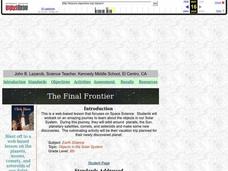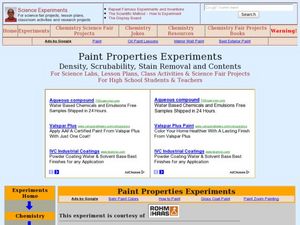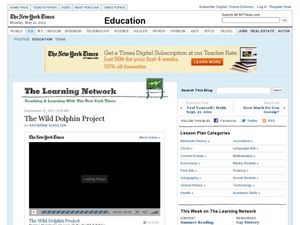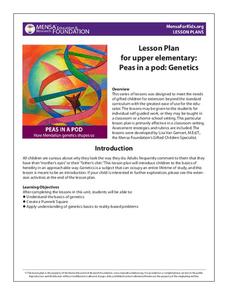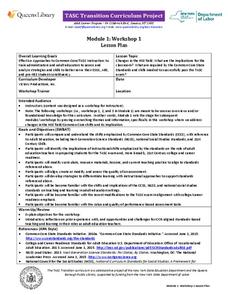Purdue University
Exploring Whirligigs
What's that silly thing spinning in the wind? It's a whirligig! Explore wonderful windy whirligigs with a STEM-based unit that teaches the science and concepts behind these gigs. Scholars discover how gravity and air resistance...
California Academy of Science
Optimal and Sustainable: Renewable Energy Revamp
More than 100 cities around the world have shifted from fossil fuels to renewable energy sources. Scholars investigate a city wanting to make this switch, but needs help determining how to make the shift. Groups consider all options,...
Curated OER
Acceleration
The mechanics of rollercoasters, and the acceleration and velocities reached with the different kinds, are outlined in this presentation. Although short, this would be a great starter for a class working with building rollercoasters or...
Curated OER
Ocean Animals - A Kindergarten Research Project
Something’s fishy! Assign each of your pupils an individual sea creature and investigate the oceans. Young oceanographers utilize Kidspiration software to research a creature, illustrate an image, and create fact cards about their...
Teach Engineering
Breathing Cells
Pairs work together to determine whether unknown solutions are either acids or bases by using a red cabbage indicator solution. After determining the general pH of the unknown solution, classmates blow into the same indicator after...
Curated OER
Snakes: Recycled Art
Make snakes with your class to demonstrate how recycled materials are perfect for art. Learners use colorful plastic cups, pantyhose, paper fasteners, and fishing line to make articulated snakes. This project would be great when learning...
Curated OER
Planets in Our Solar System
Each member of a four-student group takes on a specific aspect of an assigned planet to research. After gathering information, the team works together to create a travel brochure and a presentation intended to convince other classmates...
New York State Education Department
TASC Transition Curriculum: Workshop 3
Teachers turning into high schoolers? It's not Freaky Friday! It's a thoughtful workshop that teaches participants how to plan professional development for staff. Third in a 15-part series, the workshop provides a platform for the other...
Curated OER
Ecosystems
A critical look into the structure and function of ecosystems is here for young learners as a series of lessons and worksheet activities. Topics covered include land-based and marine ecosystems, connections to the water cycle, food webs,...
Curated OER
The Gene Scene
Sixth-grade scientists gain understanding of how genetic traits manifest with simple experiments, such as determining whether their tongues are roller or non-roller, taster or non-taster. Extensions include performing tests at home with...
Pace University
Grades 9-12 Earth Science
How has Earth changed over time? Pupils explore the topic in a differentiated instruction unit on the geological time scale. After a pre-assessment to gauge knowledge, class members divide into groups based on their ability levels and...
National Wildlife Federation
Citizen Science to the Rescue!
You don't have to be a scientist or even out of high school to contribute to scientific research. In the 12th lesson in the series of 21, scholars use this opportunity to add to the growing body of scientific knowledge and consider the...
National Wildlife Federation
What is DBH?
When measuring the circumference of a tree, does it matter how high you place the measuring tape? Most scholars have never considered this question, but scientists know that measurement techniques must be standardized. The 13th...
Sea World
Shark!
Is that a shark? Here's a 10-lesson unit that will have learners expanding their definition of what a shark actually is as they examine different features, habitats, and diets. They explore endangered species, using information cards...
Curated OER
Quantitative Determination of the Composition of Water-based Paints and the Correlation of Paint Properties to Pain Composition
Students perform a series of tests on water-based paints. In this chemistry lesson plan, students identify their different functions. They calculate paint density and fractional concentrations.
Curated OER
Publisher Brochures
Students create brochures on subjects they are studying in Publisher. In this nonfiction writing lesson, students use Publisher to create a brochure telling all the main ideas of a topic they are studying. Students use text boxes, fonts...
Curated OER
The Wild Dolphin Project
Inspire young marine biologists to study animals in the wild with this assignment. Pupils view an eight-minute video and read an article in the New York Times about Denise Herzing's 25-year long study of dolphins in their own natural...
Columbus City Schools
Biome Basics with a Disastrous Twist
Bored with your current biome bag of tricks? This bundle is a bountiful bag of biome fun! Travel the globe with seventh graders and explore the biotic and abiotic factors that define our world's biomes. Then, introduce a little chaos to...
Learning Games Lab
The pH Scale and Meter Calibration
What are the different ways to test for pH? First, scholars explore the pH scale and a common way to test for acidity and alkalinity. Then, they learn about the importance of pH in food safety and why variance in pH could potentially...
Learning Games Lab
Testing and Adjusting pH
Pupils learn how to control food spoilage by adjusting the food's pH. They see that one of the most dangerous bacteria can grow in food if people don't handle and store food properly. Using knowledge of the bacteria's preferred pH,...
MENSA Education & Research Foundation
Peas in a Pod: Genetics
Can peas have grandparents? Learn about inherited traits and heredity with a set of activities focused on Mendelian genetics. As your class learns about the process of passing traits along in Punnett squares, they take on the role of...
New York State Education Department
TASC Transition Curriculum: Workshop 1
Work out your core, Common Core State Standards, through the first workshop in a series of 15 designed for educators. Inquiry-based activities designed for all content areas and grade levels explore the shifts to new standards,...
NOAA
Seamounts
How do chains of islands form? Young oceanographers explore the mountains of the deep in the final installment in a 13-part series. The interactive compares types of seamounts based on their overall height and height under the water, as...
NOAA
Energy from the Oceans
Can Earth's oceans produce a steady supply of clean energy? Scholars explore the uses of tidal and thermal energy in the 11th installment of a 13-part series about ocean-based alternative energy sources. Learners examine the current...
Other popular searches
- Project Based Learning Plans
- Project Based Learning Math
- Project Based Learning Science
- Project Based Learning Music
- Project Based Learning History
- Project Based Learning Health
- Project Based Learning Fall
- Project Based Learning English
- Project Based Learning Water
- Project Based Learning Units
- Project Based Learning Spanish
- Project Based Learning Plans








